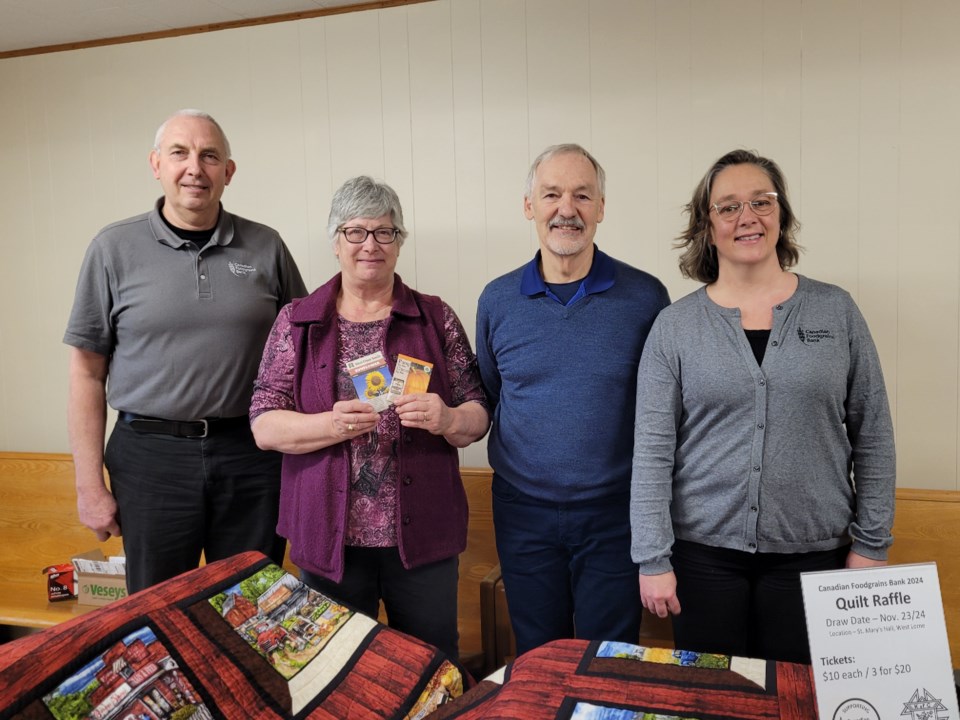ROCKWOOD – A man walking on a beach noticed thousands of starfish washed up on shore. Trying to throw as many as he could back into the water, a passerby asked, ‘why are you doing that?’
The man said, ‘well, it meant a lot to that one.'
That’s what Bill Allen from Rockwood says is the mission when working towards ending world hunger.
“We can’t fix everything, but we can sure do something that is so appreciated by people,” Allen said.
After travelling to Malawi, Allen shared his experiences with the farming community at the Canadian Foodgrains Bank spring meeting at Stone United Church in Rockwood, last month.
The group came together to talk about efforts to help end international hunger, and how locally, people are making a global difference through farming groups they participate in, called growing projects.
Canadian Foodgrains Bank is a partnership of 15 Canadian churches and church-based agencies that work together to end global hunger.
The Christian organization works with locally based organizations in developing countries to meet emergency food needs, achieve long-term solutions to hunger, and promote action by Canadians and governments.
Since 1983, Canadian Foodgrains Bank has provided $1 billion of food related assistance and has worked with over 100 international partners to address global hunger.
“In 2020, about 65 per cent of our response would go to emergency response and 35 per cent went to long term responses," said Canadian Foodgrains Bank supporter relations manager, Julie Derksen.
"Given the extreme circumstances in the last year or so, 72 per cent is going towards emergency responses because the need is greater.”
Canadian Foodgrains Bank Ontario regional representative, Henry Reinders, said with over 32,000 people dead and 17,000 children separated from their parents, the situation in Gaza remains catastrophic.
"Our members in Gaza are programming food as best they can through Jordan. There is enough food around Gaza waiting to get in to feed everyone, but the difficulty is getting it in," Reinders said.
"It's slow and it’s a trickle so we really need to see a cease fire there to make any sort of a difference. The Gaza situation is historically unprecedented, but we do the best we can.”
Allen has supported Canadian Foodgrains Bank initiatives for over 25 years. As one of 10 members selected to tour Malawi, he was able to see the ongoing impacts and efforts the organization has in communities across the African country.
“Most of the poverty is in rural areas that are really lacking infrastructure. One of our projects involves conservation and agriculture by trying to improve farming practices and promote conservation agriculture," Allen said.
“Going to Malawi, I was able to see how money was being spent. The world relief agencies are critical as the government does not provide assistance. But the people are resilient. And they are very appreciative of the support they receive."
Locally, Barb and Bob Parker, who operate a farm just south of Eden Mills, have begun a local growing project called Bushels for Change in support of the Canadian Foodgrains Bank.
Through community growing projects, farmers work together to plant, tend, harvest and sell crops. All proceeds support Canadian Foodgrains Bank and are then matched by the federal government.
“We have supported Canadian Foodgrains Bank for over 20 years at the United Church in Eden Mills until it closed in 2014. So, a few of us came to Stone United Church and started here in 2018,” Barb Parker said.
“We don’t have access to additional land in this area where we can actually grow crops, so we had the idea to work by donations and have a fun growing project, by growing giant pumpkins, the tallest sunflower, and the biggest zucchini.”
Bushels for Change hosts an annual community fundraising breakfast as well as a 'wrap up' meal after each growing season.
“People come, enjoy and donate. We started our 'harvest table' last year. With surplus produce in people's gardens or orchards, we ended up with fresh produce, so we made apple sauce and relish. People from the congregations donated and the surplus was sent to the Royal City Mission in Guelph,” Parker said.
"Everything went to good use, and we are doing the same this year. And for anyone interested, we also offer seeds."
Parker has a variety of seeds including sunflower, zucchini, bean, squash, pumpkin, carrot and beat.
“This comes back as produce and goes back to help us raise funds as part of our donations. We are small, but somehow we’ve been able to donate between $7,000 - $9,000 with each year over the last five or six years. It’s a lot of fun and that’s a big part of it,” Parker said.
For more information about Bushels for Change, contact [email protected].



